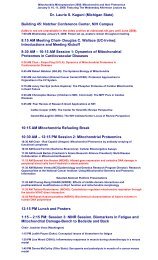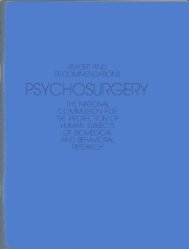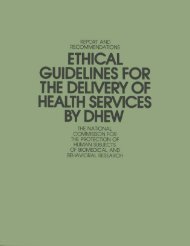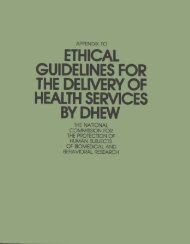RESEARCH ON THE FETUS - National Institutes of Health
RESEARCH ON THE FETUS - National Institutes of Health
RESEARCH ON THE FETUS - National Institutes of Health
Create successful ePaper yourself
Turn your PDF publications into a flip-book with our unique Google optimized e-Paper software.
statement <strong>of</strong> its deliberations and conclusions appears in Section VIII, and the<br />
recommendations themselves are set forth in Section IX, together with a statement<br />
by a member <strong>of</strong> the Commission dissenting in part from the recommendations.<br />
Separate views <strong>of</strong> members <strong>of</strong> the Commission are set forth in Section X.<br />
The Appendix to the report contains the entire text <strong>of</strong> the papers and<br />
reports that were prepared under contract to the Commission, and certain other<br />
materials that were reviewed by the Commission during its deliberations.<br />
Legislative Background. The <strong>National</strong> Research Act contains two provisions<br />
regarding research on the fetus: (1) the mandate to the Commission to conduct<br />
studies and make recommendations to the Secretary, DHEW, (section 202(b)), and<br />
(2) a prohibition, in effect until the Commission has made recommendations, on<br />
"research [conducted or supported by DHEW] in the United States or abroad on a<br />
living human fetus, before or after the induced abortion <strong>of</strong> such fetus, unless<br />
such research is done for the purpose <strong>of</strong> assuring the survival <strong>of</strong> such fetus"<br />
(section 213). These two provisions were drafted by a conference committee<br />
that resolved the differences between the acts originally passed in 1973 by the<br />
House <strong>of</strong> Representatives and Senate, respectively.<br />
The original House act contained a prohibition against the conduct or<br />
support by DHEW <strong>of</strong> research that would violate any ethical standard adopted by<br />
the <strong>National</strong> <strong>Institutes</strong> <strong>of</strong> <strong>Health</strong> or the <strong>National</strong> Institute <strong>of</strong> Mental <strong>Health</strong>.<br />
This provision was perceived as a prohibition <strong>of</strong> research on the living fetus,<br />
as a result <strong>of</strong> policy then in force at NIH. In addition, both the House and<br />
Senate acts contained floor amendments explicitly prohibiting the conduct or<br />
support <strong>of</strong> research on the fetus by DHEW. The House amendment, adopted by a<br />
vote <strong>of</strong> 354 to 9, proscribed research on a fetus that is outside the uterus and<br />
has a beating heart, while the Senate prohibition applied to research in connection<br />
with an abortion. Among other differences between the acts, the House<br />
prohibitions were permanent, while the Senate prohibition was temporary. The<br />
conference committee adopted the Senate approach, imposing a moratorium until<br />
this Commission made recommendations. The moratorium adopted by the conference<br />
committee applies to research conducted on a fetus before or after an induced<br />
abortion <strong>of</strong> the fetus (except to assure the survival <strong>of</strong> the fetus); the mandate<br />
for the Commission's study and recommendations applies more generally to research<br />
involving the living fetus.<br />
2











